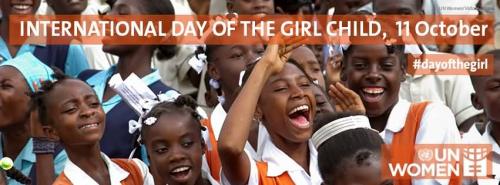
http://www.un.org/en/events/girlchild/
Since 2012, 11 October has been marked as the International Day of the Girl. The day aims to highlight and address the needs and challenges girls face, while promoting girls' empowerment and the fulfillment of their human rights.
2018 theme: With Her: A Skilled GirlForce
Today's generation of girls are preparing to enter a world of work that is being transformed by innovation and automation. Educated and skilled workers are in great demand, but roughly a quarter of young people – most of them female – are currently neither employed or in education or training.
Of the 1 billion young people – including 600 million adolescent girls – that will enter the workforce in the next decade, more than 90% of those living in developing countries will work in the informal sector, where low or no pay, abuse and exploitation are common.
On 11 October, International Day of the Girl, we are working alongside all girls to expand existing learning opportunities, chart new pathways and calling on the global community to rethink how to prepare them for a successful transition into the world of work.
Under the theme, With Her: A Skilled GirlForce, International Day of the Girl will mark the beginning of a year-long effort to bring together partners and stakeholders to advocate for, and draw attention and investments to, the most pressing needs and opportunities for girls to attain skills for employability.
Secretary-General's Message for 2018
Today, 600 million adolescent girls are preparing to enter a world of work transformed by innovation and automation. They are the largest generation in history and a vast source of ideas and solutions for all career fields. Yet far too often, girls are not given the space and opportunities they need to achieve their full potential. Multiple barriers include systematic discrimination, biases and lack of training.
We need concerted efforts to overcome the obstacles that mean that, for example, women make up less than 30 per cent of graduates in information and communications technology and occupy less than 30 per cent of research and development jobs worldwide
Negative gender stereotypes related to girls’ education in science, technology, engineering and mathematics begin as early as primary school, and have the devastating effect of making them doubt their own potential.
Although the number of girls attending school is the highest ever, many are still not getting the skills necessary for lifelong success. Moreover, it is estimated that five years from now, over one-third of the abilities considered important in today’s workforce will have changed.
We need to equip girls with transferable and lifelong skills such as critical thinking, creativity and digital awareness. Having role models will also be critical, especially in the sciences and other fields where the presence of women is sparse.
To help empower young people, I recently launched Youth2030, a strategy that aims to work with them, understand their needs and help put their ideas into action. On this International Day of the Girl, let us recommit to supporting every girl to develop her skills, enter the workforce on equal terms and reach her full potential.
António Guterres










Add new comment